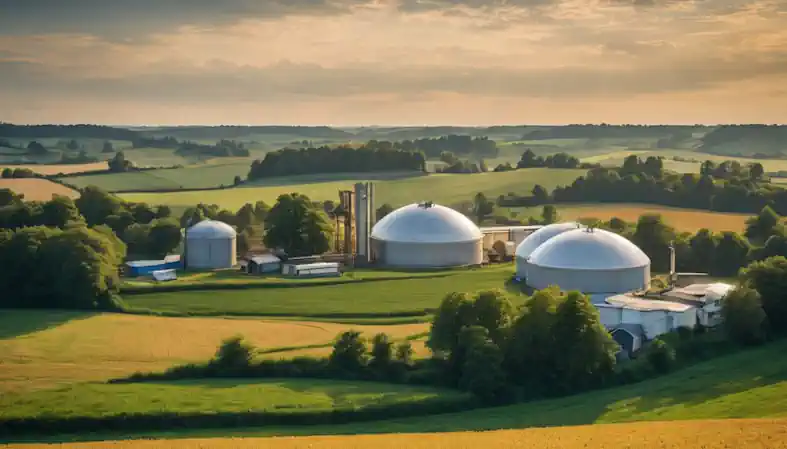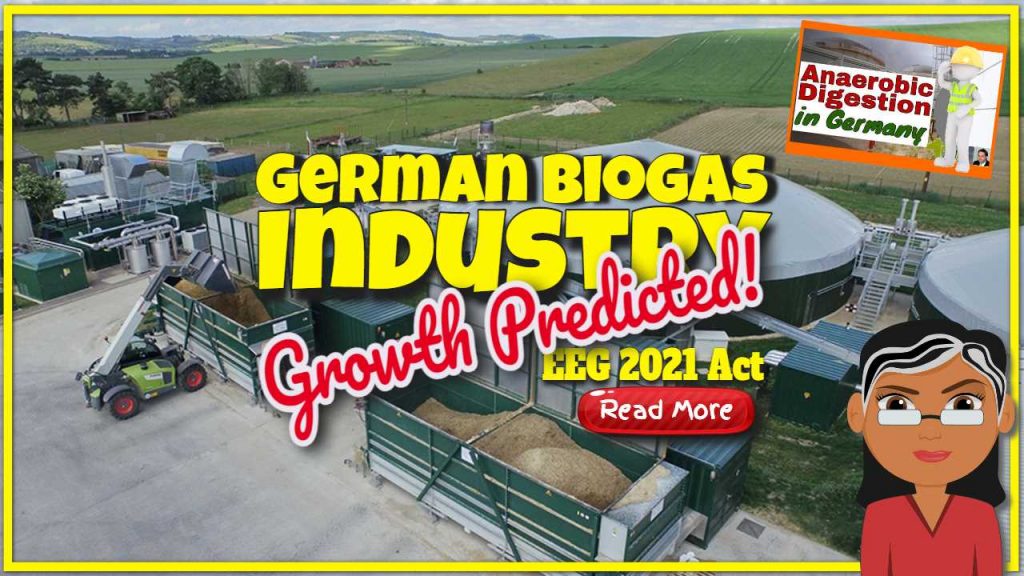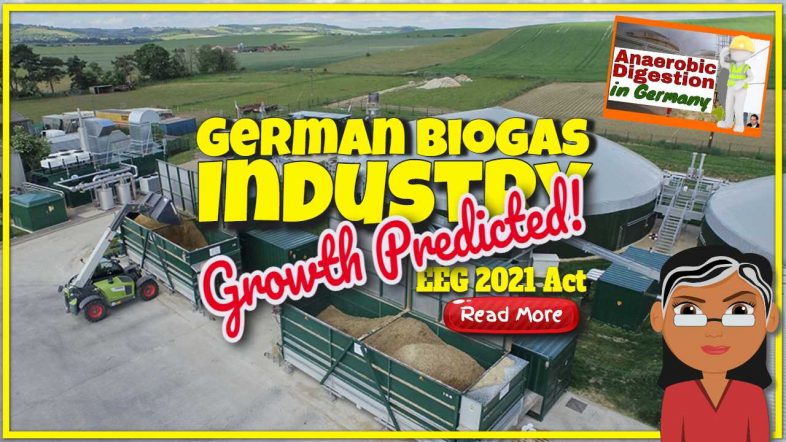Anaerobic digestion in Germany is forecast to expand. There is good reason to be optimistic about the prospects of growth in the German anaerobic digestion industry due to the passing of the new 2021 Renewable Energy Sources Act (EEG) by the Bundestag, which took place just before Christmas 2020.
This promises to be a major step towards a substantial increase in biogas generation in Germany, benefiting not only the AD industry but also contributing to the nation's action against climate change.
Anaerobic Digestion in Germany and Growth Prospects for the German Biogas Industry
Anaerobic digestion is transforming the energy landscape in Germany, carving out an important niche within the realm of renewable resources. This process harnesses natural degradation, when air is absent, to turn organic waste into biogas, effectively converting what was once merely rubbish into a beacon of sustainability.
The German Renewable Energy Act (EEG) 2021 has sent ripples through the nation's biogas sector, shaping how it contributes to the nation's power grid and challenging its growth trajectory. Boasting 50 TWh of final energy from biogas alone last year, Germany illustrates its commitment to a green transformation.
But the future for biogas in Germany, as elsewhere, hinges on legislative support; thus, navigating these policies becomes crucial for everyone, from municipal decision-makers to agricultural enterprises seeking sustainable solutions.
Read on for insights into how EEG 2021 could fuel or dampen Germany’s journey toward clean energy autonomy. Discover the potential that lies ahead!
Key Takeaways
- Anaerobic digestion turns waste into biogas, a clean energy source. In Germany, companies like LIPP GmbH make technology for this.
- The EEG 2021 Act helps the German biogas industry grow by supporting renewable energy and reducing the need for outside gas.
- Biogas is used in farms, cities, and industries in Germany to make power and heat for CHP use. It can also help reduce the level of nutrients in intensive stock-rearing areas that are subject to nitrogen/ nitrate pollution of groundwater and dispose of waste better.
- Challenges for German biogas include people not wanting plants nearby and less government support. But there are chances to grow more biomass power and work abroad.
- If used well, laws like EEG 2021 could create more jobs in renewable energy in Germany and other countries too.
[boomdevs_toc]

Anaerobic Digestion in Germany
Anaerobic digestion and biogas production play a crucial role in the German industrial, municipal, and agricultural sectors. The process involves the breakdown of organic materials to produce biogas, with LIPP GmbH at the forefront of providing high-quality equipment and technology for this purpose.
Importance for industry, municipalities, and agriculture
Biogas already plays a big role in German industries, cities, and farms. It helps them make energy from waste like food scraps, manure, and plant materials.
This way, they use less oil and gas from other countries. They also save money on energy bills and help cut down on greenhouse gases.
Farms use biogas to turn animal poop into power and heat. Cities make energy with it too by using leftovers from homes and gardens. Industries benefit by getting steady energy that is kinder to the planet.
Biogas facility development gives everyone more choices for clean power in Germany.
Process and technology
Anaerobic digestion is the process where microorganisms break down organic matter in the absence of oxygen, producing biogas. This biogas consists mainly of methane and carbon dioxide.
In Germany, companies like LIPP GmbH specialise in providing advanced anaerobic digestion technology for effective biogas production from a variety of substrates such as agricultural waste, food waste, and organic residues.
List of German anaerobic digestion and biogas Companies
The following is a list of five top German anaerobic digestion and biogas companies, including detailed information about each company:
1. Weltec Biopower GmbH
Location: Vechta, Germany
Overview: Founded in 2001, Weltec Biopower GmbH is a global leader in constructing and operating biogas and biomethane plants. The company has implemented over 350 energy plants in more than 25 countries, serving sectors like waste and food industry, agriculture, and wastewater.
2. EnviTec Biogas AG
Location: Lohne, Germany
Overview: EnviTec Biogas AG is a prominent all-rounder in the biogas sector, offering comprehensive services for energy production from biomass. Their portfolio includes custom plant concepts, an all-around service, and green solutions for biomethane and electricity marketing, as well as heating solutions.
3. n-bio GmbH
Location: Konstanz, Germany
Overview: Specializing in biogas production from organic waste and renewable crops, n-bio GmbH has over ten years of experience in constructing and operating biogas plants. The company boasts extensive expertise in both plant construction and management.
4. Agraferm Technologies AG
Location: Pfaffenhofen, Germany
Overview: Agraferm Technologies AG is known for designing and building anaerobic digestion plants, distinguishing itself as one of the few full-service providers of turnkey agricultural and industrial biogas plants in Europe.
5. AEV Energy GmbH
Location: Dresden, Germany
Overview: AEV Energy GmbH offers specialized services in plant design, process engineering, and equipment supply for sorting and anaerobic treatment of organic residue and highly polluted organic wastewater, including biogas handling and utilization.
These companies represent the forefront of technological innovation and sustainable practices in the anaerobic digestion and biogas sector in Germany.
The technology involved in anaerobic digestion not only facilitates waste management by converting organic material into renewable energy but also contributes to reducing greenhouse gas emissions.

German Government Support for the Anaerobic Digestion Industry
German government support through policies like the Renewable Energies Act (EEG) and tax reliefs offers a conducive environment for the development and utilisation of efficient anaerobic digestion processes.
These initiatives aim to enhance energy security while promoting sustainable practices within various industries.
The capabilities of German companies like Weltec Biopower GmbH, and others, emphasize their dedication to advancing anaerobic digestion technology, positioning them at the forefront of sustainable energy solutions in Germany's evolving landscape.
Quality, materials, and substrates
The quality of substrates used in anaerobic digestion greatly impacts biogas production. High-quality feedstock materials such as food waste, agricultural residues, and organic industrial waste contain a higher energy content suitable for efficient biogas generation.
The choice of substrates also affects the composition and purity of the biogas produced. With careful selection and management of substrates, optimum methane yield can be achieved, contributing to the overall efficiency and sustainability of biogas production.
Many German-based biogas equipment manufacturers specialize in providing high-quality materials and technologies for anaerobic digestion processes. Their expertise ensures that the substrates utilized meet stringent quality standards for optimal biogas production while minimizing environmental impact.
The use of advanced materials also enhances process reliability and longevity, aligning with German policies aimed at encouraging sustainable energy practices through efficient biomass utilization.
German Biogas Industry Growth
The German biogas industry is experiencing growth prospects with the implementation of the EEG 2021 Act, which aims to promote biogas for water treatment, waste digestion, and renewable energy production.
To learn more about the potential impact and opportunities in this industry, keep reading.

EEG 2021 Act – Utilisation of Biogas
The EEG 2021 Act came into effect on January 1, 2021, to bring about a shift in German renewable power producers’ market orientation. It aims to make them more market-oriented while impacting the future prospects of biogas development in Germany.
This legislation is crucial for expanding the utilization of biogas, as it affects energy tax reliefs and supports measures for renewable power producers. The act also influences the security of the gas supply by promoting biomethane production from biogas and reducing dependence on imported natural gas.
Additionally, it offers a basis for the support of expanded utilization of biogas in Germany through its policies and tax relief measures.
The new EEG Amendment has implications beyond simply supporting renewable energy; it directly impacts the anaerobic digestion industry's growth prospects and potential opportunities in Germany's waste management sector.
This amendment could be beneficial if utilized effectively by stimulating innovation and investment in sustainable practices within the industry. However, challenges such as reduced legislated support may pose hurdles for industry stakeholders striving to contribute to both renewable energy production growth and environmental sustainability efforts.
Biogas for water treatment and waste digestion
The use of biogas for water treatment and waste digestion is crucial in Germany. With around 50 TWh of final energy provided in 2021, biogas plays a significant role in these areas.
Biogas, which consists primarily of methane (55–60%) and carbon dioxide (40–45%), can be effectively utilized as a fuel, thereby contributing to environmental sustainability and renewable energy production.
Furthermore, it offers opportunities for waste digestion, helping in the efficient management of organic waste while producing valuable energy.
Promoting the utilization of biogas in water treatment and waste digestion aligns with the Renewable Energies Act (EEG) and its efforts toward market-oriented renewable power producers.
System solutions for sludge digestion
LIPP GmbH offers advanced system solutions for efficient sludge digestion, contributing to sustainable waste management and renewable energy production. These solutions employ innovative technologies that maximize biogas yield from organic waste, supporting the circular economy initiative in Germany.
The use of high-quality materials ensures durability and reliability while accommodating a variety of substrates, including sewage sludge and organic residues. Such advancements align with the country's focus on increasing biogas production from diverse biomass sources, promoting self-sufficiency in energy supply.
The implementation of system solutions for sludge digestion not only addresses waste management challenges but also plays a vital role in enhancing renewable energy production. As part of the German government's efforts to achieve environmental sustainability goals, these solutions contribute significantly by utilizing organic waste streams to generate valuable biogas.
This underscores the potential for expanding anaerobic digestion capacity across various sectors, such as municipalities, agriculture, and industrial facilities. Embracing such innovations represents a pivotal step towards ensuring a greener future while reducing dependence on conventional fossil fuels.
Role in renewable energy production
The German biogas industry plays a significant role in renewable energy production, contributing to the reduction of greenhouse gas emissions and dependence on fossil fuels. Biogas, primarily composed of methane and carbon dioxide, is a valuable source of green energy for power generation and heat production.
With 50 TWh of final energy provided in 2021, biogas has emerged as a key player in Germany's renewable energy landscape. Policy measures like the Renewable Energies Act (EEG) and tax reliefs further support the prospects for increased utilization.
Moreover, the production of biomethane from biogas holds the potential to enhance the security of gas supply in Germany.
As the country moves towards market-oriented renewable power producers under the EEG Amendment 2021 Act, biogas stands poised to play an increasingly promising role in primary energy supply.
Challenges and Opportunities
The German biogas industry faces challenges such as acceptance issues, the potential cut of legislated support, and a consolidation phase. However, there are also opportunities for growth in biomass power and business expansion abroad.

Acceptance issues
The German biogas industry faces acceptance issues from local communities, impacting the development of biogas plants. These issues stem from concerns about the odors, noise, and transportation associated with biogas facilities, leading to resistance from nearby residents and municipalities.
Moreover, there are also worries about potential impacts on property values and tourism in areas where biogas plants are located.
Increased public awareness and engagement can help address these acceptance issues. This involves transparent communication about the benefits of biogas as a renewable energy source and implementing best practices for odor control and environmental protection.
Cut of legislated support
The cut in legislated support for the German biogas industry has raised concerns about its growth prospects. The new EEG 2021 Act has brought about changes that may hinder the expansion of anaerobic digestion in Germany and reduce the country's chance to decrease dependence on imported natural gas.
This reduction in support poses a challenge for the industry, particularly in light of its potential contribution to renewable energy production and the security of gas supply.
The implementation of the EEG 2021 Act has an impact on how biogas will develop in Germany in the future, with policy measures and tax relief playing a crucial role. The impact on market orientation for renewable power producers will significantly shape the industry's trajectory, creating both challenges and opportunities for growth despite acceptance issues and a consolidation phase.
Consolidation phase
The biogas industry in Germany is currently experiencing a consolidation phase, facing both challenges and opportunities. With the implementation of the EEG 2021 Act, the industry is navigating acceptance issues and coping with a cut in legislated support funding.
However, amidst these challenges lies growth potential in biomass power as well as promising business opportunities abroad. This phase calls for strategic measures to harness the growth potential supported by policy measures and tax reliefs to ensure sustainable development within the industry.
While navigating through this consolidation phase driven by the EEG 2021 Act, stakeholders in anaerobic digestion must recognize that despite its challenges, there remains significant potential for growth in biomass power utilization.
Growth potential in biomass power
The potential for growth in biomass power is a key aspect of Germany's renewable energy strategy. The development and utilization of biogas, derived from anaerobic digestion of organic materials, play a crucial role in this sector.
Biogas can contribute significantly to sustainable energy production and reduce dependence on imported natural gas, aligning with the country's commitment to renewable energy sources under the EEG 2021 Act.
Moreover, with increasing policy support and tax reliefs for expanded utilization of biogas in Germany, there are evident opportunities for further advancements in biomass power generation.
These initiatives are expected to incentivize investment and innovation within the industry while also promoting environmental sustainability through reduced greenhouse gas emissions.
Business opportunities abroad
The growth potential in biomass power within the German biogas industry has opened up promising business opportunities abroad. Environmental researchers, waste management professionals, and government officials should take note of the expanding market overseas.
With Germany's expertise and experience in anaerobic digestion and biogas production, there is an opportunity to transfer knowledge and technology to other countries seeking sustainable energy solutions.
The demand for renewable energy sources worldwide presents a significant prospect for German businesses to export their biogas technologies and system solutions, contributing to global efforts to mitigate climate change.
The EEG 2021 Act has implications beyond Germany's borders, with its focus on making renewable power producers more market-oriented. This shift can also encourage foreign investments in German biogas projects as well as partnerships for technology transfer.
Future Prospects
The future prospects for anaerobic digestion and the German biogas industry look promising, with low potential competition from other renewable energy sources. There is also an opportunity to expand into new energy plants and heat utilization, furthering the sustainability and environmental benefits of biogas.
Competition with other renewable energy sources
Biogas faces competition from other renewable energy sources, like solar and wind power. While these sources are more established, biogas offers benefits in terms of consistent, always-on, energy production regardless of weather conditions.
Additionally, biogas plants can be set up in distributed locations to reduce demands on the national grid, including areas not suitable for solar or wind installations. This versatility gives biogas an edge in providing renewable energy solutions where other sources may not be as effective.
Government support is crucial in determining the competitiveness of different renewable energy sources. In the UK, the EEG 2021 Act will impact how renewable power producers operate in the market.
It's important to consider the long-term implications of this act on biogas and other renewables. For example, the potential role of biomass energy should not be overlooked when assessing future sustainability and primary energy supply options.
Promising role in primary energy supply
The promising role of biogas in Germany's primary energy supply is evident from its contribution of 50 TWh of final energy in 2021, primarily in the form of power and heat. The production and utilization of biomethane from biogas also play a crucial role in enhancing the security of the gas supply within the country.
Biogas has the potential for expanded utilization as a significant component of Germany's primary energy mix thanks to policy measures and tax reliefs like the Renewable Energies Act (EEG) and energy tax reliefs.
The implementation of the EEG 2021 Act further influences future prospects for biogas development, aiming to make renewable power producers more market-oriented.
Expanding into new energy plants and heat utilization
The promising role of biogas in primary energy supply sets the stage for expanding into new energy plants and heat utilization. With its capabilities in providing power and heat, biogas showcases the potential for further integration into the energy sector.
Waste management professionals, government officials, and environmental researchers can explore the opportunities presented by utilizing biogas in new energy plants to meet renewable energy targets while also addressing heat demands.
The expansion of new energy plants not only supports sustainability objectives but also contributes to reducing dependence on imported natural gas.
In addition to addressing renewable energy needs, the utilization of biogas for heat production offers a sustainable solution for meeting heating demands across various sectors. Government officials can consider integrating biogas technology into district heating systems as a means to promote sustainable heating solutions that align with environmental policies.
Sustainability and environmental benefits of biogas.
Biogas, produced from organic waste, plays a crucial role in sustainable waste management by diverting organic material from landfills and reducing methane emissions. It also helps in mitigating climate change by displacing fossil fuels and decreasing greenhouse gas emissions.
The production of biogas supports the circular economy by converting organic waste into a valuable energy resource, promoting resource efficiency and environmental sustainability.
The utilization of biogas contributes to improved air quality as it reduces the release of harmful pollutants associated with traditional waste management methods. Additionally, the implementation of anaerobic digestion technology for biogas production aids in controlling odour issues related to organic waste decomposition.
Conclusion
In conclusion, the German biogas industry faces both challenges and opportunities under the EEG 2021 Act. Market-oriented policies and tax relief have an impact on the prospects for future development, providing a useful growth roadmap.
How can these strategies be applied in your professional context? Have you considered the potential impact of embracing renewable energy solutions? Highlighting their importance is crucial to realizing significant improvements in sustainability.
Explore additional resources to delve deeper into this vital topic and drive change within your sphere of influence. Let's pave the way for sustainable energy with actionable steps and impactful decisions.
FAQs
1. What is anaerobic digestion in Germany?
Anaerobic digestion in Germany is a process that turns organic waste into biogas for energy, and it's part of the country’s plan to make more clean power.
2. How does the EEG 2021 Act affect German biogas industry growth?
The EEG 2021 Act boosts the German biogas industry by offering better support and rules that encourage making more energy from biogas.
3. Can businesses in Germany benefit from investing in biogas?
Yes, businesses can gain from investing in anaerobic digestion because the EEG 2021 gives them chances to grow with new policies pushing green energy.
4. Will Biogas production increase thanks to new policies?
New policies like those in the EEG 2021 are expected to help produce more biogas, meaning we may see an uptick in this renewable energy source across Germany.
[This article was first published 15 February 2021.]








Great post. It a very good to use aerobic Digestion to save our limited environmental resources and make it more sustainable.
Have you considered locating this facility in a third-world country with abundant raw materials and low-cost labour?